Dynamics of social contagions with limited contact capacity
- Wang, Wei Web Sciences Center, University of Electronic Science and Technology of China, Chengdu, China
- Shu, Panpan Web Sciences Center, University of Electronic Science and Technology of China, Chengdu, China
- Zhu, Yu-Xiao Web Sciences Center, University of Electronic Science and Technology of China, Chengdu, China
- Tang, Ming Web Sciences Center, University of Electronic Science and Technology of China, Chengdu, China - Big data research center, University of Electronic Science and Technology of China, Chengdu, China
- Zhang, Yi-Cheng Department of Physics, University of Fribourg, Switzerland
-
01.10.2015
Published in:
- Chaos: An Interdisciplinary Journal of Nonlinear Science. - 2015, vol. 25, no. 10, p. 103102
English
Individuals are always limited by some inelastic resources, such as time and energy, which restrict them to dedicate to social interaction and limit their contact capacities. Contact capacity plays an important role in dynamics of social contagions, which so far has eluded theoretical analysis. In this paper, we first propose a non-Markovian model to understand the effects of contact capacity on social contagions, in which each adopted individual can only contact and transmit the information to a finite number of neighbors. We then develop a heterogeneous edge-based compartmental theory for this model, and a remarkable agreement with simulations is obtained. Through theory and simulations, we find that enlarging the contact capacity makes the network more fragile to behavior spreading. Interestingly, we find that both the continuous and discontinuous dependence of the final adoption size on the information transmission probability can arise. There is a crossover phenomenon between the two types of dependence. More specifically, the crossover phenomenon can be induced by enlarging the contact capacity only when the degree exponent is above a critical degree exponent, while the final behavior adoption size always grows continuously for any contact capacity when degree exponent is below the critical degree exponent.
- Faculty
- Faculté des sciences et de médecine
- Department
- Département de Physique
- Language
-
- English
- Classification
- Physics
- License
- License undefined
- Identifiers
-
- RERO DOC 258070
- DOI 10.1063/1.4929761
- Persistent URL
- https://folia.unifr.ch/unifr/documents/304694
Statistics
Document views: 293
File downloads:
- zha_dsc.pdf: 113
